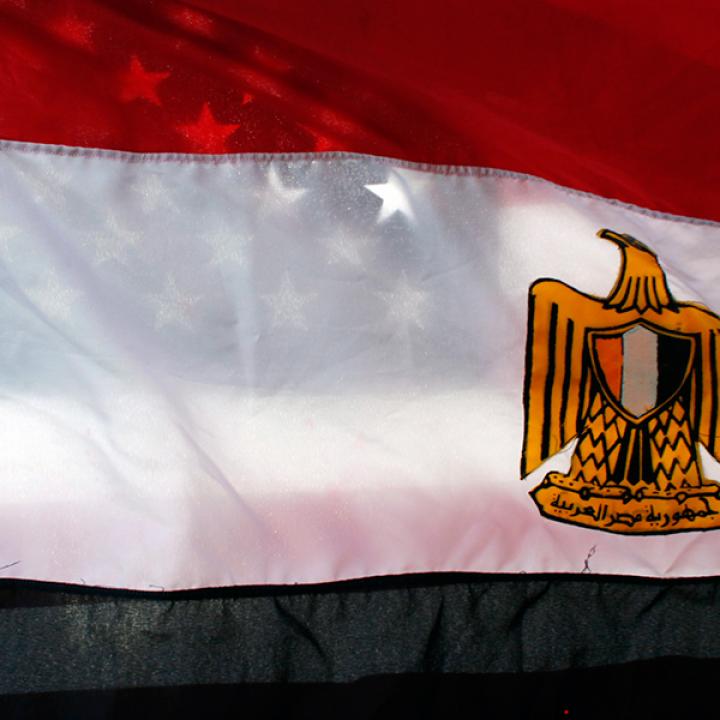
- Policy Analysis
- Articles & Op-Eds
How Egyptians' Conspiracy Theories About Clinton Explain Trump's Appeal to Them

Egyptians have welcomed news that the Democratic presidential candidate will meet with President Sisi, but rumors such as those linking Clinton to the Muslim Brotherhood are nevertheless likely to persist.
Hillary Clinton and Donald Trump are to meet with Egyptian President Abdel Fattah al-Sisi on Monday on the sidelines of the United Nations General Assembly. Whereas Mr. Trump's meeting is consistent with his admiration for strongmen and therefore unsurprising, Mrs. Clinton's meeting has surprised some in Egypt, where prevalent conspiracy theories depict her as a supporter of the Muslim Brotherhood and, therefore, an enemy of the current government.
Many Egyptians, including senior government officials, believe that Muslim Brotherhood leader Mohamed Morsi won the June 2012 presidential election thanks to pressure from Mrs. Clinton. As with many conspiracy theories, this one is rooted in a twisted interpretation of what Mrs. Clinton actually said at the time.
Four days before Egypt's election results were announced, Mrs. Clinton remarked that "it is imperative that the military fulfill its promise to the Egyptian people to turn power over to the legitimate winner." (In the same interview, she also said that "we don't know yet who's going to be named the winner.")
The then-secretary of state inadvertently played into this conspiracy theory two weeks after Mr. Morsi took office, when she visited Cairo. During a press briefing, Mrs. Clinton said, "The United States supports the full transition to civilian rule, with all that it entails." This was interpreted in Egypt as supporting the Brotherhood in its low-grade power struggle with the military. Hours after her visit, Egypt's defense minister, then Mohamed Hussein Tantawi, said, "The armed forces will not allow anyone, especially those pushed from outside, to distract it from its role as the protector of Egypt." This was widely interpreted as a rebuke of Mrs. Clinton; he also said that he would never allow "a certain group" -- meaning the Brotherhood -- to dominate the country.
Some Egyptian media outlets continue to suggest that Mrs. Clinton's top aide Huma Abedin is secretly a member of the Muslim Brotherhood, pointing to comments such as Mrs. Clinton likening Ms. Abedin to a "second daughter" as a sort of "evidence" of Mrs. Clinton's closeness to the Brotherhood. Some Egyptian outlets suggested last year that Mr. Morsi's wife had promised to release "secret communications" between her husband and Mrs. Clinton that would reveal their "special relationship."
These conspiracy theories badly mischaracterize Mrs. Clinton's outlook on the political situation that followed the January 2011 uprisings in Egypt. Mrs. Clinton was vocally skeptical of the uprising and disagreed with President Barack Obama's decision to embrace the Tahrir Square protests. In her 2014 memoir, Mrs. Clinton recounts her negative first impressions of Mr. Morsi and speaks deferentially of Gen. Tantawi. She wrote that Mr. Sisi "appears to be following the classic mold of Middle Eastern strongmen." She also said her takeaway from the Obama administration's experience navigating the Arab Spring is that Washington's attempt to "walk a tightrope, promoting democratic values and strategic interests without taking sides or backing particular candidates or factions" bred further mistrust.
Many Egyptians are not familiar with those views. Instead, it is widely believed in Egypt that Mrs. Clinton admitted in her memoir that she helped create the Islamic State, and Donald Trump's remarks accusing her and President Obama of that have been widely reported in Egypt.
These conspiracy theories have bred a not-always-subtle preference for Mr. Trump among Egyptian officials and elites. Although many dislike his comments about Muslims, those remarks are often viewed as campaign rhetoric, and more attention is paid to Mr. Trump's pledges to destroy ISIS and to work with autocratic leaders. Former parliamentarian Mohamed Kamal, who once served on the policy committee of Hosni Mubarak's ruling party, recently wrote in the Egyptian daily Al Masry Al Youm: "Anyone following Trump's statements will find that many of them agree with the positions of the Egyptian state during the current period."
News that Mrs. Clinton and Mr. Sisi would meet has been welcomed within Egypt and even inspired suggestions that the Muslim Brotherhood is trying to prevent their conversation.
Former Foreign Minister Mohamed Orabi, chairman of the parliamentary foreign affairs committee, said in an interview on Saturday that he expects bilateral relations to improve no matter who wins the U.S. presidential election and that Cairo had no preference. He added that no matter who wins in November, U.S. thinking will continue to impose chaos on the Middle East. That last remark is a reminder that news and developments do not tend to debunk conspiracy theories, and that the ones about Mrs. Clinton will linger well past her meeting this week with Mr. Sisi.
Eric Trager is the Esther K. Wagner Fellow at The Washington Institute. This article originally appeared on the Wall Street Journal blog "Think Tank."
Wall Street Journal



